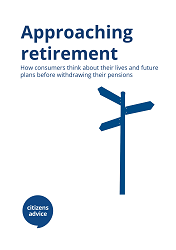Approaching Retirement
 The pension freedoms introduced in April 2015 removed the effective requirement for consumers to purchase a guaranteed income product with their defined contribution (DC) pensions. This has created far more choice for consumers to draw their savings in ways that suits their personal circumstances.
The pension freedoms introduced in April 2015 removed the effective requirement for consumers to purchase a guaranteed income product with their defined contribution (DC) pensions. This has created far more choice for consumers to draw their savings in ways that suits their personal circumstances.
Approaching Retirement [ 1.8 mb] is the first report of a three part series exploring how consumers think about and experience pension freedoms in the context of their broader lives. Here we consider the attitudes of consumers in their 50s and 60s who have DC pensions but have not yet started making active plans to withdraw them. The second report will consider the experience of consumers withdrawing their DC pensions and the third will explore their thoughts on retirement after taking advantage of pension freedoms.
The key finding in this report is that many consumers don’t have a firm understanding of how their pension savings will convert into retirement income. They are effectively flying blind towards retirement, hoping that they will be able to make do with what their eventual income, rather than feeling that they can adjust their saving levels to target the retirement income they want.
This happens for three key reasons. Firstly, consumers have much on their minds in their broader lives, especially as they start approaching retirement. Many are thinking about caring for parents, children or grandchildren, including those in the ‘sandwich generation’ who are considering multiple generations. Our quantitative research shows that some have key hopes to travel (51%) and relax while also having major fears about health (73%) and money. Consumers have a powerful conception of making the most of their ‘good years’ in retirement and more than three in four (77%) see remaining active generally or through holidays as a key aspiration.
Pension freedoms can facilitate this and allow people to phase into retirement, staying in work while also having more time to pursue other priorities. However, our research also shows that while consumers want to make the most of their good years, they often avoid planning for what will happen if their health deteriorates. Just 12% see not being able to fund future care costs as a key concern, even though over three quarters are likely to have a care need at some point in their retirement. 1
Secondly, many consumers expect to have complicated retirement income streams. These includes traditional state and private pension incomes both for the individual and their partner if they have one. On top of this our research shows that three in four (74%) consumers with DC pensions see at least one other source - such as other savings, property or future inheritance - as key to their retirement income. Property is sometimes seen to compensate for undersaving, which raises questions for future generations if they have lower property wealth. As Figure A shows, these complex income sources create uncertainties which make it hard for consumers to know what income they should expect and how much (and how) they should save.
Thirdly, consumers face specific barriers to engaging with their pensions, as presented in Figure B. Many are deterred because they don’t feel confident in their understanding of how pensions work. Some see their inability to predict accurately how their pensions and personal needs will change as a reason to defer engaging. Others have cognitive biases against thinking about pensions (because it makes them feel old or concerned that they haven’t saved enough) or simply feel too busy to focus on pensions.
In our qualitative research we observed a strong sense that many consumers do not want to invest time trying to understand pensions until they actively want to withdraw their savings. While this can sometimes be rational, such as to avoid the stress of short term market fluctuations, it also risks leaving consumers sleepwalking towards bad or arbitrary retirement incomes. Without understanding what their pension savings will convert into as an income, many resort to a wait-and-see approach.
1. Building the National Care Service, HM Government, 2010, p.125.

